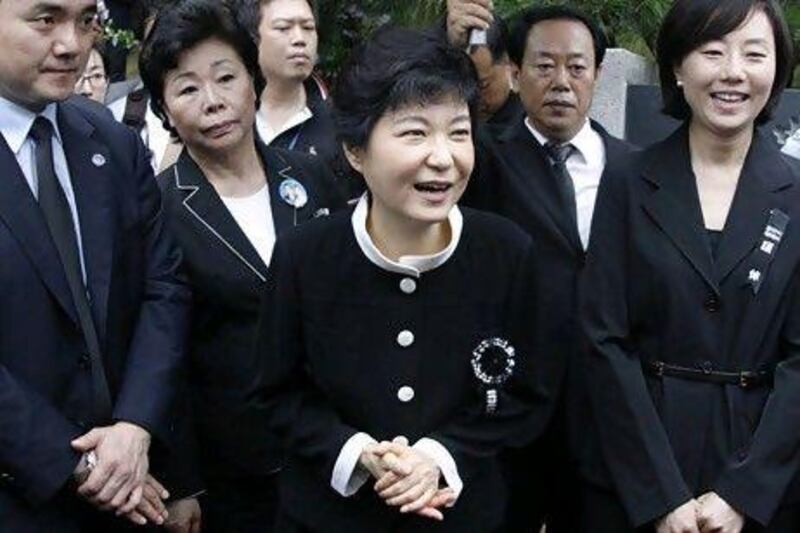OKCHEON, SOUTH KOREA // Park Geun-hye was 22 when she washed the blood from her assassinated mother's dress. Five years later, she recalls in her autobiography, she held her father's blood-soaked shirt after the South Korean dictator was shot dead.
Now, both hampered and helped by the contrasting legacies of her murdered parents, she appears on the cusp of becoming South Korea's first female president.
Ms Park, 60, was chosen as the presidential candidate for the ruling conservatives last week and polls show she is the front-runner for a December election.
For some South Koreans, it is the memory of Mrs Park's father, Park Chung-hee, that comes to mind when they think of her. A military dictator, his 18-year rule dragged the country out of poverty, at the cost of human rights.
He is still a controversial figure in the country and Ms Park's opponents will aim to tar her with his brush in the election race.
But it is recollections of her mother, Yuk Young-soo, once known as "the mother of the nation", that look set to help propel Ms Park into the presidential Blue House.
She is remembered for acts of charity that included a famous visit to a leper colony where she shook hands with and embraced the sick. She remains South Korea's most popular first lady by far, polls show.
For many South Koreans, Ms Park's frugal lifestyle as a single woman living in a modest home in the capital, as well as her simple clothes and 1970s hairstyle, bring her mother to mind.
"Park looks like her mother when she greets people and smiles," said Lee Young-ho, sitting under the curved roof of Yuk's old home in the town of Okcheon, where she lived until she married Park.
Mr Lee should know. A former soldier and Vietnam War veteran, he was a member of the presidential guard in the 1970s and worked closely with the Park family.
The traditional Korean house in which Mr Lee spoke has become a shrine to Yuk, with hundreds of people visiting every day.
Mr Lee, 68, is an official with Park's New Frontier Party and has also co-authored a biography of Yuk. He is confident Ms Park can maintain her double-digit lead in the polls and win an election victory which, he says, would somehow make up for the sacrifices. "A kind of debt can be paid back when Park becomes president," he said.
Yuk was 49 when, on August 15, 1974, she was killed by a stray bullet after a pro-North Korean assassin shot at her husband. Witnesses said the skies turning "reddish-purple" upon her death.
Although her family's story is well known, Ms Park is deeply private and cautious about her politics. She disappeared from public life in 1979 after the assassination of her father by his intelligence chief, only to resurface in 1997 to "help save" the country from a devastating Asian financial crisis.
She has never clearly defined her policies on issues such as taxation, spending and welfare. She says she shares her mother's vision of a more equal society and has pledged to work for that.
"It was my mother's dream and her dream is now mine," she said at her mother's memorial service this month.
Critics say she has failed to apologise sufficiently for her father's rule. She said his 1961 coup was "unavoidable and the best possible choice". At the same time, she says she has always been "apologetic" to victims of her father's brutal push for industrialisation, when he crushed opposition in an effort to drive export-led growth.
Her likely opponent, the former human rights lawyer Moon Jae-in, who forged his political credentials in the pro-democracy movement, accuses Ms Park of being a throwback to dictatorship.
"When I was living in poverty, she was living the life of a princess in the Blue House," Mr Moon said. "When I was fighting against dictatorship, she was at the heart of it."
* Reuters





